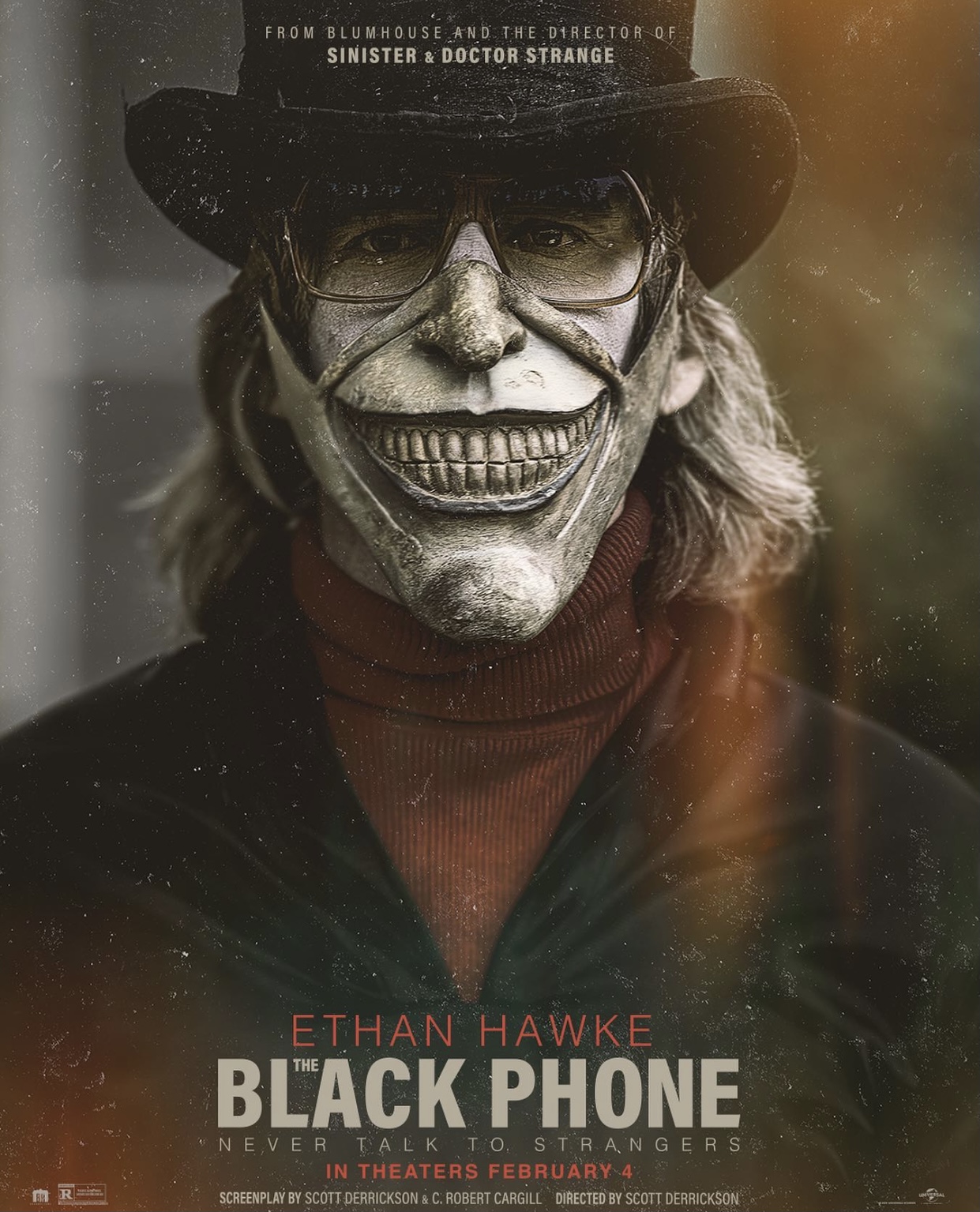Ethan Hawke plays the villain in this sleek, stressful, and violent zeitgeist of a horror film, but we don’t understand why the release date falls way after Halloween, such a missed opportunity to leverage on the spookiness of the season.
One minute you’re invisible and the next minute the whole state knows your name.” A young and phantom voice speaks this ominous fact over a rotary phone receiver into the ear of the town’s latest kid who’s gone missing. Isolated in a basement with a single window too high to access and an antiquated phone, Finney Shaw (Mason Thames) accepts his new reality like he does every day in the outside world. He’s used to being the victim of everything kids fear: bullies, the death of a loved one, being unpopular, crossing an abusive caregiver, saying the wrong thing to your crush, even jumping too much while watching a scary movie alone. However, with a little help from beyond the grave, Finney may have just enough fight left in him to face his ultimate fear head-on.
Adapted from Joe Hill’s short story of the same name, “The Black Phone” is a violent zeitgeist of a horror film that captures the audience’s emotions as quickly as the film’s antagonist kidnaps children in broad daylight. Ethan Hawke stars as a masked kidnapper (nicknamed “The Grabber”) who terrorizes a suburban Colorado town in the 1970s. Hiding behind the facade of a clumsy magician, he lures kids in with kindness before eclipsing their world with mace and a swarm of signature black balloons. The story is told through Finney’s perspective as audiences get a glimpse into his home and personal life before he becomes the kidnapper’s latest victim. In between dodging his classmates on the prowl to beat him up, Finney has to walk on eggshells at home in order to avoid any further abuse from his alcoholic father. The only solace he can find is alongside his sister Gwen (Madeleine McGraw), a sweet yet religious spitfire in pigtails, who has no qualms about cussing out cops or smashing a rock over a bully’s head.
However, support comes in supernatural form once Finney winds up in a derelict basement with bare resources sprawled about and a black phone on the wall. His kidnapper, donning a two-piece interchangeable mask (designed by legendary Tom Savini) taunts him with a ritualistic game that has to occur in order for any torture and Finney’s subsequent death to unfold. Despite being informed that the phone does not work, Finney begins to receive calls from the kidnapper’s previous victims as they provide him useful information for his survival. All the while, Gwen investigates her brother’s disappearance by utilizing her dreams as a catalyst for her clairvoyant abilities.
Hill’s short story is a creepy bare-bones framework, which allows Derrickson and Cargill to deeply flesh out the characters. Finney and Gwen have an admirable relationship where they protect one another from the dangers that stalk them inside and outside of their home. Thames brings a tender sense of vulnerability to Finney but his character arc is exactly what audiences want to see from an underdog protagonist. From the start, McGraw is a force to be reckoned with and is described as “sunshine in the apocalypse” by Cargill in the film’s Q&A. Her performance as Gwen is a powerhouse of emotion whether it’s crying for mercy at the hand of her father’s belt or bluntly asking Jesus why he won’t do more to help.
While Hawke typically avoids villainous roles, it’s clear that he enjoyed playing “The Grabber.” Throughout most of the film, his face is hidden but Hawke uses this to his advantage by playfully adjusting his voice and fluctuating from a menacing captor to a calm presence that teases Finney at a potential release. There are elements similar to John Wayne Gacy present, but the abuse does not cross into sexual territory. What’s also great about this particular villain is that his character does not leave any cravings for a backstory. The “why” of his heinous actions is not a general focus. His behavior is simply summed up with a certain kind of unexplainable evil that is all too common in the news. The fact that Derrickson and Cargill chose to keep his origin story absent works extremely well with the film’s tone and overall dread the story elicits.
The supernatural aspect of dead children talking to Finney over the phone may sound bland, but is executed well through special effects and eerie editing. Their severed voices are coupled with a gory presentation of what “The Grabber” did to them in their final hours, a stark portrait that produces a handful of well-timed and effective jump scares. All the while, production designer Patti Podesta and costume designer Amy Andrews beautifully immerse audiences into the seventies in a naturalistic manner that does not feel forced or overdone for nostalgia purposes. To build upon this time frame, Brett Jutkiewicz adds texture to the film’s story with grainy cinematography and vintage light that captures the dichotomy of a sleepy town being ravaged by a prolific killer.
“The Black Phone” is a succinct and stressful terror blanketed with themes of friendship, family, and inventive portrayals of resiliency. Every aspect of the film is emotionally arresting and tackles timeless fears with razor-sharp precision. Derrickson and Cargill’s collaborative vision navigates horror down multiple avenues and preys upon traditional forms of strengths and weaknesses through aspects of religion and familiarity. For example, terror can live next door in the form of a murderer while simultaneously residing in your heart or simply walking down the hallways at school. The duo who brought audiences “Sinister” now provides a film with a bleak yet entertaining reminder that horror is omnipresent, but sometimes you can find a lifeline in the darkest of hours if you just listen.
Grade: A-
“The Black Phone” premiered at Fantastic Fest. Universal Pictures will release it theatrically on January 28, 2022.
BUY SLAY NETWORK NFTs on BITCLOUT
Source Indie Wire





